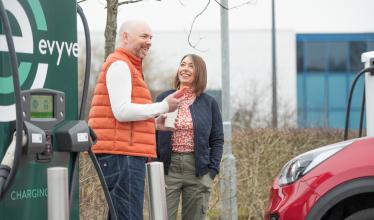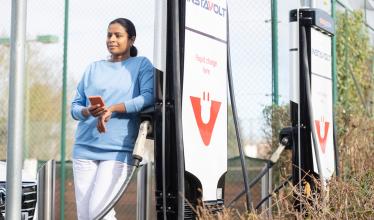Electric Car Tax
Many people are now driving electric vehicles (EVs), encouraged in part by government incentives attached to electric cars and vans.
This guide outlines electric car tax and company electric car tax in the UK, highlighting the benefits drivers will gain in taxing an EV rather than a conventional petrol/diesel car.
Electric car tax – VED

‘Car tax’ – formally known as Vehicle Excise Duty (VED) – is based either on CO2 emissions or (for older conventional cars) on engine size.
Since March 2001, car tax rates have been based on thirteen car tax bands, each defined by a range of tailpipe CO2 emissions as measured on the official test.
The current VED system was introduced in April 2017, which sees a standard rate for all vehicles charged from the second tax year onwards. The thirteen vehicle CO2 emissions bands remain for the First Year Rate (FYR) – which is a flat £155 per year – and there is a Premium Rate to pay on top of the Standard Rate for all models costing more than £40,000 when new.
The only exceptions are for Alternatively Fuelled Vehicles, which see £10 taken off the FYR and Standard Rate, and include plug-in hybrids (PHEVs) Pure electric vehicles are the only band where nothing is paid either for the FYR or Standard Rate. Should the EV cost more than £40,000, the £335 Premium Rate would still apply.
It is important to note that even though EV drivers can tax their vehicle at zero cost, they must still register the car for legal reasons. Drivers can do this online, in person at a Post Office or by phone.
Energy Tax

Fuel Excise Duty (FED) is a UK fuel tax that is added to the price of road transport fuels before they are sold. This duty applies to all hydrocarbon based fuels including petrol, diesel, biodiesel, and liquefied petroleum gas (LPG) sold for use by vehicles licensed for road use in the UK. Currently, UK fuel duty is currently 58p per litre for petrol and diesel.
As battery electric vehicles (BEVs) are powered by electricity only, no fuel duties are currently levied. However, VAT still applies but is generally charged at a much lower rate than for road fuel (5% versus 20%).
In most cases for electric cars and vans, fuel costs can be as low as 3p per mile (depending on your supplier and tariff). For an annual mileage of around 10,000 miles per year, switching from a conventional to an electric car or van could therefore save you around £1,000 in fuel costs alone.
However, plug-in hybrid drivers will be charged FED when filling their vehicle with liquid fuel. For PHEVs, fuel cost saving will depend on how often a PHEV is recharged, as opposed to refuelled. For a car taking half its energy from externally supplied electricity, fuel costs will be cut by around £400 per year for the average driver.
Company Electric Car Tax

Company car tax is designed to encourage employers and company car drivers to choose cars with lower levels of CO2 emissions; incentives are offered both to the company and to the recipient of the vehicle to select low emission vehicles.
Under the current system, company and employee company car tax are both based on a percentage of the official price of the car (called the ‘P11D’), the percentage, being primarily determined by the car’s CO2 emissions. For the employee, the benefit-in-kind (BIK) is then taxed at the appropriate personal tax rate (usually collected through the PAYE system).
For zero-emission battery electric cars, company electric car tax is currently set at 1% for 2021-22, before rising to 2% from 2022 until 2025.
For PHEVs with CO2 emissions up to 50 g/km CO2 and a range of greater than 130 miles, BIK rates are the same as for pure-electric models, at 1% for 2021 to 2022. As the range decreases, the tax rate increases up to 13% for those with an electric range of less than 30 miles in order to promote the use of the greenest models.
Above 50g/km CO2, it doesn’t matter what range the PHEV has, it is categorised as any other model, with BIK rates starting at 14% for 2021-22, rising to 15% from 2022.
EV Basics

Zapmap’s EV Basics page outlines important technology information and characteristics of the different types of EV. In addition, it talks about the driving experience you will get from an EV and clarifies the environmental benefits of their uptake.
EV Buying Guide

The Zapmap electric vehicles buying guide provides all the information you need to ensure you select an electric vehicle that is catered to your individual needs. It covers costs, grants and the practicalities of owning an EV and includes a section for fleet owners.



